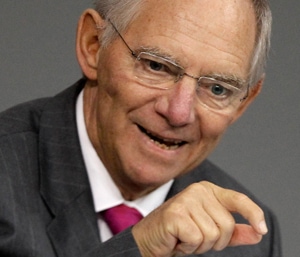NEWSMAKERS: GLOBAL
By Michael Shari
As finance ministers and top executives of the world’s largest banks converge in Washington for the annual meetings of the International Monetary Fund and the World Bank this month, a simmering diplomatic conflict between the US and the EU about reform of the two institutions threatens to boil over. At issue is how much power to give emerging-market countries, whose weight in the global economy has grown, not least because their banks escaped exposure to the toxic mortgage-backed assets that have gutted American and European banks.
German finance minister Wolfgang Schäuble inadvertently nudged the conflict to the brink of diplomatic flashpoint at a meeting of EU finance ministers last month in Brussels. According to a German government official, Schäuble proposed a controversial four-point plan to restructure the IMF in a manner that would give the emerging markets more seats on the IMF’s board of directors as well as more voting rights. It was the first European attempt to answer US demands that EU countries surrender some of their power in the IMF to China and other emerging markets, the official said. But in return, the plan called for the US to curtail its own dominant role in the IMF to a point where it would lose its cherished veto power.
Schäuble’s idea of a compromise translated into precisely the caliber of ammunition that US lawmakers needed to put the Treasury on the spot—and make a show of defending American hegemony over the global financial system. A host of concessions that the Obama administration has debated for emerging markets came under fire. “Is the administration willing to give up the presidency of the World Bank, which could undermine our ability to promote innovation at this flagship institution?” an incredulous senator Dick Lugar demanded at a Senate Committee on Foreign Relations hearing in mid-September. “Also, what is the administration’s view of current calls for the US to give up the veto at the IMF, which could erode American support for that institution?”
In response, a composed assistant Treasury secretary Marisa Lago played down the idea of considering an emerging-market candidate for the top job at the World Bank, whose president is traditionally an American, or at the IMF, where the executive director is traditionally a European. She noted that “in agreeing on the capital contributions we certainly had a keen eye to maintaining our leadership position in each of these institutions.”
But Lago said the administration does support “giving increasing voice to emerging and developing countries.” She added, “We do not believe that that calls into question the US veto.” According to Edwin Truman, a senior fellow at the Peterson Institute for International Economics in Washington, Lago’s comments show that Washington effectively rejected the German proposal. The US commands about 17% of the votes at the IMF, where an 85% majority is required for a vote to pass on key issues, making the US the only country with veto power.
 |
|
Stirrer: Schäuble’s comments exacerbated a simmering diplomatic dispute |
Treasury secretary Tim Geithner turned up the heat on Europe in a Senate Banking, Housing and Urban Affairs Committee hearing. “European countries,” he testified, “have eight seats on the board, and they have a much more disproportionate share of votes in the IMF than is commensurate with their economic strength in the world.” He added, “We support a change in the balance of power to catch up with this big shift in global activity.”
Otherwise, Geithner testified, the U.S. will use its veto to shrink the IMF’s board from 24 seats to 20 at its upcoming internal election in November. The US would accomplish this by voting against extending four “extra” seats, one of which is currently held by Switzerland, says Truman.
“It’s more than a threat,” says Truman, a former assistant Treasury secretary. “This is an exercise in chicken.”



